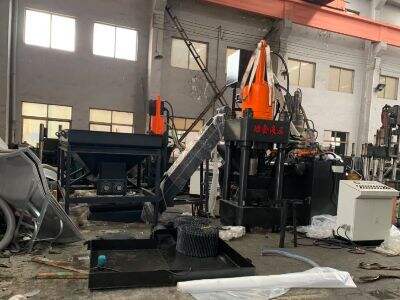يمكن تحقيق تقليل الهدر من خلال إعادة التدوير الضرورية لحفظ الموارد. في صناعة المعدن، تكون إعادة التدوير مفيدة بشكل خاص. لكن هل فكرت يومًا كيف يتم إعادة تدوير المعادن؟ في هذا المقال سنناقش هذه العملية المثيرة وكيف تساعد بيئتنا.
كما يوحي الاسم، يتم استخدامه لصنع بريكيتات من المعدن (مسحوق). الاستخدام الرئيسي لهذه الآلات يكون في مراكز إعادة التدوير حيث يقومون بإعادة تدوير جميع المعادن القابلة لإعادة التدوير، ويحولون المعادن الخردة والقطع المتبقية من المنتجات القديمة مثل السيارات والثلاجات إلى شيء جديد. تم نشر المقال في شركة جيانغين ميتالورجي، وهي واحدة من أكبر الشركات المصنعة لأجهزة صنع البريكيتات المعدنية التي تعمل بشكل رئيسي في السوق العالمية. هذه آلات جيدة وكفؤة.
لماذا تعتبر عملية ضغط المعادن مهمة؟
تُعتبر هذه الآلات مهمة جدًا في إعادة تدوير المعدن بسبب عدة أسباب. أولها أنها قادرة على ضغط كمية كبيرة جدًا من فضلات المعدن إلى حجم أصغر. وهذا مفيد جدًا لأنه يعني أن الصلب يمكن حفظه ونقله بسرعة. إنه يعطينا قطع صغيرة يمكننا وضعها في شاحنة أو مكان التخزين. وهذا يعني أيضًا استخدام أقل للتخزين، مما يكون أفضل لعالمنا. لأن استخدام المساحة أقل يعني أننا نستطيع الحفاظ على بيئتنا نظيفة ومرتبة.
يمكن لهذه الآلات العمل على أنواع مختلفة من المعادن مثل الصلب، الحديد، الألمنيوم والنحاس البرونزي. لكل معدن عملية مستقلة ولكل منها قيمته الخاصة ونحن آلة بريكيت المعادن نعمل بناءً عليها جميعًا. القطع التي يتم تشكيلها تلقائيًا وتخرج تُسمى كتل مضغوطة. يمكن بيع هذه الفضلات مرة أخرى إلى الصناعة كمواد خام لإنتاج منتجات جديدة. وهذا يجعلها صديقة للموارد ومفيدة للبيئة، حيث يتم قتل عدد أقل من الكائنات الحية.
المزيد من المال وأقل قمامة
كما يمكنك أن ترى، تتيح آلات ضغط المعادن للشركات تحقيق أرباح أكبر وإهدار أقل. يزداد سعر الحديد لكل طن من الخردة عندما يتم معالجتها إلى بريكيتات. يجب على الشركات أن تحصل على سعر يتجاوز المبلغ المتاح للخردة العادية. آلة بريكيت المعادن هذا يسمح لهم بإنشاء إيرادات أعلى على المواد الزائدة، مما يحافظ على ربح الأعمال.
تساعد هذه الآلات أيضًا في تقليل الهدر. بدلاً من التخلص من خردة المعادن في مكب النفايات بتكلفة، تقوم هذه الآلات بإعادة تدويرها وجعلها تعمل لصالحها. يمكن أن يكون هذا مربحًا لجميع الأطراف المعنية، بما في ذلك البيئة. نحن نمنع الهدر ونساعد في جعل كوكب أنظف عن طريق السماح للناس باستخدام ما كان الكثيرون سيتخلصون منه.
إعادة التدوير من النفايات إلى المواد الخام
إنها جميعها آلات ضغط المعادن التي يمكنها تحويل المعدن الخردة إلى موارد جديدة. عندما يدخل المعدن الخردة إلى الآلة، يتم ضغطه إلى كتلة مضغوطة للغاية. إنها نظام إشعال بالضغط، وبالتالي فهي صغيرة الحجم مما يجعلها سهلة الاستخدام. النتيجة جهاز صنع البيليت تباع بدورها للمستهلكين الصناعيين كمورد جديد، والذي يمكن أن يخدم كمادة خام جديدة للتصنيع.
هذا مثال رائع للاقتصاد الدائري. ببساطة، يتم تحويل النفايات مرة أخرى إلى شيء يمكن أن يكون مفيدًا في الاقتصاد الدائري - من المهد إلى تمديد دورة الحياة، أليس كذلك؟ باستخدام آلات ضغط المعادن، يمكن للصناعة إعادة تدوير المعادن إنشاء نظام قوي يُamaximize من العائد من المعدن الخردة. هذا لا يساعد فقط الشركات، ولكنه أيضًا يدعم المبادرات المستدامة عالميًا.
حماية البيئة بتقنية الضغط
في عالم اليوم الحديث، تعتبر الاستدامة أمرًا بالغ الأهمية. وتعني أننا نتخذ خيارات للعيش على الأرض بطريقة أكثر لطفًا عليها للأجيال القادمة. تُعد آلات ضغط المعادن أداة أساسية لإعادة تدوير المعادن بشكل مستدام. جميعها توفر الموارد والتلوث من خلال إعادة تدوير النفايات وزيادة قيمة المعادن الخردة.
بالإضافة إلى ذلك، فإن المعادن الجديدة الواسعة تستهلك طاقة أقل مقارنة بممارسات إعادة التدوير القديمة. وهذا يعني أنها تسبب أقل ضرر للبيئة ويمكن استخدامها لفترات زمنية أطول. يُرجى تذكر أنه بينما نقلل من الطاقة المستخدمة، نحافظ أيضًا على بصمتنا الكربونية (أي: هذا هو كمية الغازات الضارة التي تُطلق في الهواء) منخفضة لما يخرج من موقدنا. كل خطوة صغيرة لها أهميتها.

 EN
EN
 AR
AR
 BG
BG
 HR
HR
 CS
CS
 DA
DA
 NL
NL
 FI
FI
 FR
FR
 DE
DE
 EL
EL
 HI
HI
 IT
IT
 JA
JA
 PL
PL
 PT
PT
 RO
RO
 RU
RU
 ES
ES
 SV
SV
 CA
CA
 TL
TL
 IW
IW
 ID
ID
 LV
LV
 LT
LT
 SR
SR
 SK
SK
 UK
UK
 VI
VI
 ET
ET
 TH
TH
 TR
TR
 FA
FA
 AF
AF
 MS
MS
 BE
BE
 AZ
AZ
 LA
LA
 UZ
UZ

